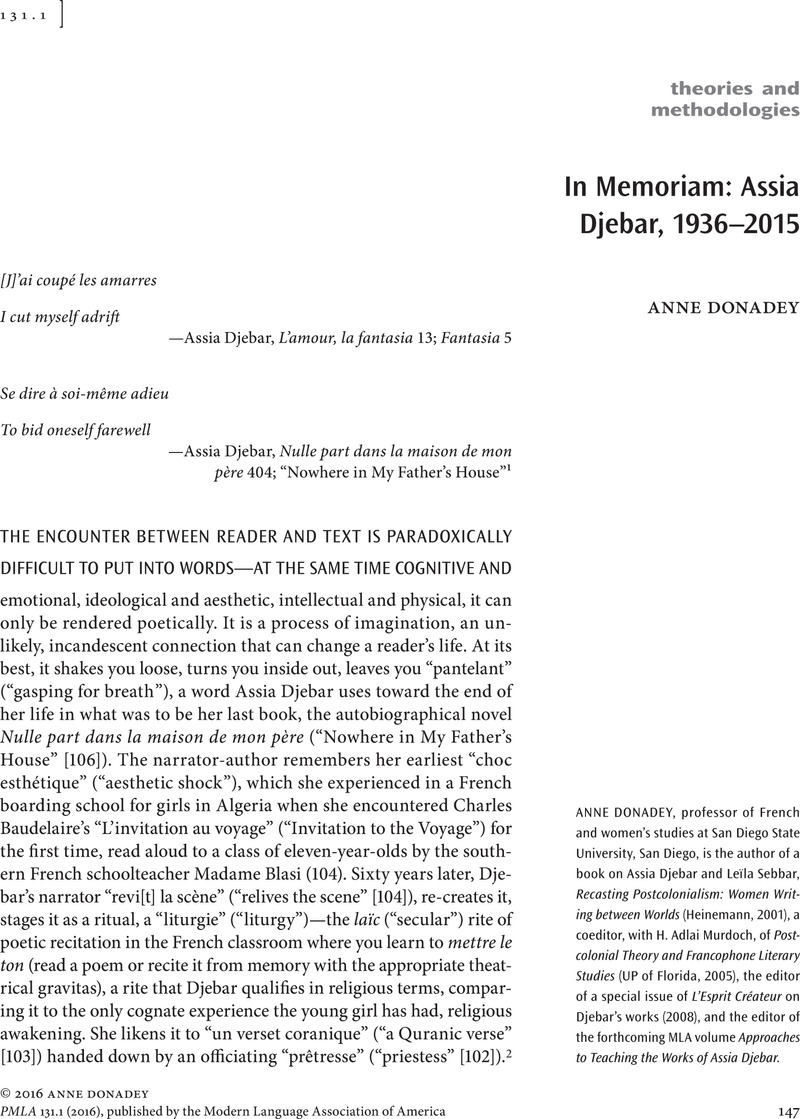No CrossRef data available.
Article contents
In Memoriam: Assia Djebar, 1936-2015
Published online by Cambridge University Press: 23 October 2020
Abstract
An abstract is not available for this content so a preview has been provided. As you have access to this content, a full PDF is available via the ‘Save PDF’ action button.

Information
- Type
- Theories and Methodologies
- Information
- Copyright
- Copyright © Modern Language Association of America, 2016
References
Works Cited
Abdo, Diya, and Bobroff, Maria. “Don't Claim to ‘Speak for’ Algerian Women: Reading Djebar across Disciplinary Borders.” Approaches to Teaching the Works of Assia Djebar. Ed. Anne Donadey. New York: MLA, forthcoming.Google Scholar
Boutaghou, Maya. “Le style en arabesque d'Assia Djebar.” French Studies 67.2 (2013): 216–31. Print.Google Scholar
Boutaghou, Maya “Writing in Bi-langue.” Approaches to Teaching the Works of Assia Djebar. Ed. Anne Donadey. New York: MLA, forthcoming.Google Scholar
Christian, Barbara. “The Race for Theory.” 1989. Making Face, Making Soul / Haciendo Caras: Creative and Critical Perspectives by Feminists of Color. Ed. Anzaldúa, Gloria. San Francisco: Aunt Lute, 1990. 335–45. Print.Google Scholar
Djebar, Assia “Entretien avec Assia Djebar, écrivain algérien.” Interview by Mildred Mortimer. Research in African Literatures 19.2 (1988): 197–205. Print.Google Scholar
Djebar, Assia Fantasia: An Algerian Cavalcade. Trans. and introd. Blair, Dorothy S. London: Quartet, 1989. Print.Google Scholar
Djebar, Assia Women of Algiers in Their Apartment. Trans. Jager, Marjolijn de. Charlottesville: Caraf; U of Virginia P, 1992. Print.Google Scholar
Donadey, Anne. Recasting Postcolonialism: Women Writing between Worlds. Portsmouth: Heinemann, 2001. Print.Google Scholar
Hutcheon, Linda. A Poetics of Postmodernism: History, Theory, Fiction. New York: Routledge, 1988. Print.Google Scholar
Lionnet, Françoise. “Reframing Baudelaire: Literary History, Biography, Postcolonial Theory, and Vernacular Languages.” French Cultural Studies: Criticism at the Crossroads. Ed. Hir, Marie-Pierre Le and Strand, Dana. Albany: State U of New York P, 2000. 153–84. Print.Google Scholar
Rosello, Mireille. France and the Maghreb: Performative Encounters. Gainesville: UP of Florida, 2005. Print.Google Scholar
Spivak, Gayatri Chakravorty. “Can the Subaltern Speak?” 1985. Colonial Discourse and Post-colonial Theory: A Reader. Ed. Williams, Patrick and Chrisman, Laura. New York: Columbia UP, 1994. 66–111. Print.Google Scholar
Spivak, Gayatri Chakravorty A Critique of Postcolonial Reason: Toward a History of the Vanishing Present. Cambridge: Harvard UP, 1999. Print.CrossRefGoogle Scholar
Spivak, Gayatri Chakravorty “Three Women's Texts and a Critique of Imperialism.” Feminisms: An Anthology of Literary Theory and Criticism. Ed. Warhol, Robyn R. and Herndl, Diane Price. New Brunswick: Rutgers UP, 1991. 798–814. Print.CrossRefGoogle Scholar
Strand, Dana. “Assia Djebar's La femme sans sépulture as Postcolonial Primer.” Contemporary French and Francophone Studies 13.3 (2009): 339–47. Print.Google Scholar
Weber-Fève, Stacey. “Assia Djebar as Film Theorist in ‘Touchia: Ouverture’ and Ces voix qui m'assiègent.” French Review 81.3 (2008): 542–50. Print.Google Scholar
Weltman-Aron, Brigitte. Algerian Imprints: Ethical Space in the Works of Assia Djebar and Hélène Cixous. New York: Columbia UP, 2015. Print.CrossRefGoogle Scholar
Zimra, Clarisse. “Disorienting the Subject in Djebar's L'amour, la fantasia.” Yale French Studies 87 (1995): 149–70. Print.Google Scholar

